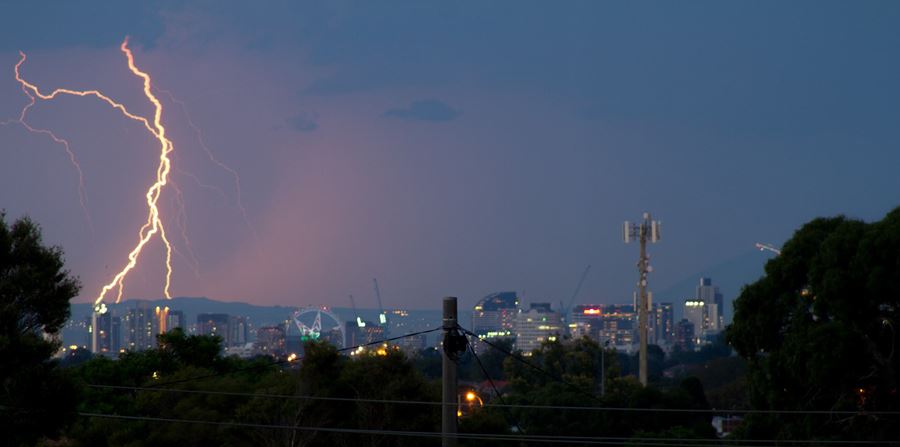Top 4 Common Summer Claims

Depending on where you live, many people wait all year for summer to come. The sunshine, the BBQs, the warm weather. But for business and homeowners, there are a number of things that can wreak havoc on critical electrical equipment and systems during this time of year.
The most common electrical claims faced by insurers during this time of year tend to be either heat or weather-related, but can sometimes be a bit tricky and complex. In this article, we outline four threats that greatly impact electrical systems: lightning, flooding, tornado/wind damage, and heat.
1. Lightning
Summer storms can bring lightning strikes, which alone, may not directly harm electrical systems. Many times it could be the power surge following the strike that can cause issues. If a unit typically uses 120-240 volts and the surge spikes up by the millions, that can cause damage to electronics that rely on that power. But it may not be seen immediately, which is where the challenging part comes into play. Did the unit stop working because of the lightning? Was it from a power surge? Was it coincidence and just age-related?
A direct strike
If there was a direct strike, it's important to note the surrounding area. Was the roof damaged, or the siding or drywall? Did a fire start? Experts look for a pattern of damage when these events occur. And typically, if there is a solid pattern, the damage may have occurred from lightning.
If no other components were damaged, it could be just typical wear and tear. If the affected, failed circuit is far from the power source or point of entry, if the property has a poor track record for maintenance, or there is a history of breakdowns, it would most likely be a failure of another kind.
Typical systems affected by lightning:
- Smart home systems, and security systems – smart installations, security cameras
- HVAC – blown fuses, damaged capacitors or compressors, burned wires
- Telecommunications – phone lines, TV, radio circuits connected to antennas
- Computer systems – network ports connected to network cables, networking equipment, data communication networks
- Home electrical systems – ground fault circuit interrupters (GFCI), LED lighting
2. Flooding
A main concern of flooding is corrosion. It can happen very quickly and can have a severe impact on wiring, terminations, and components, and can lead to failures. Immediate evaluation and restoration attempts may help save equipment and reduce the possibility of full equipment replacement. An expert can help evaluate the extent of damage to devices such as receptacles and appliances, as well as the wires that carry electricity to those devices.
It's important to note, however, that typically, what causes the corrosion is not the presence of water. It's what's in the water. Experts can come and take wipe samples to help understand the severity or possibility of corrosion and how to treat equipment to get it back up and running quickly and safely.
In many cases, the presence of water alone can spike humidity levels, which can jeopardize the use of equipment and pose serious safety and quality risks.
Business-critical equipment
Industries most impacted by flooding incidents are organizations that house business-critical equipment such as hospitals, pharmaceutical labs, manufacturing, IT, or telecom. In these instances, systems need to be back up and running fast!
Experts can help determine if the flooding damage is just cosmetic, if damage to critical systems and equipment truly occurred, how and why it occurred, and put all involved parties on a path towards recovery.
3. Tornado or Wind Damage
During tornadoes or severe summer storms, trees can fall on power lines causing issues for nearby businesses. High voltage lines can also come down and affect low voltage lines, causing damage to equipment and even fires.
For adjusters, the same philosophy can be applied in terms of finding a pattern of damage. For example, if a CNC shop loses one phase of power from a three-phase building power supply and multiple machines go down, it is prudent to look for a blown fuse, an opened thermal overload, a broken wire, or mechanical failure, first, before assuming the damage was caused by a wind event.
The best thing to do to speed up the claim process, and help experts evaluate as quickly as possible, is to take an inventory of what is damaged. Then the expert knows immediately what needs to be evaluated and what doesn't.
4. Heat
In the hot summer months, HVAC systems are working harder to move heat out and to keep the cool air in. High-temperature running equipment can also put quite a strain on the HVAC system. And, this is especially true in regions where it's much hotter.
When failures occur, and a claim involving high temperatures is concerned, an expert looks at a number of things including age-related wear and tear, failure to service, failure to maintain, and if the utility provider failed to provide service to the unit. If it was heat-related, following up on those common reasons can typically indicate if the unit was overworked.
- Was there evidence of burned wiring?
- Were there complaints of lights flickering?
- Had people regularly serviced the equipment and do they have a service contract?
Final Thoughts
Summer may be a season many people look forward to, but that doesn't mean business-critical equipment is safe from potential hazards. It's important to remember to look for a pattern of damage for most claims involving weather. If the failure happened as more of a one-off, it may not be directly correlated to a storm.
Flooding can and does happen during brutal and severe summer storms, and can cause more damage to the equipment if left alone. Speed of analysis is paramount due to submersion, humidity, and corrosion.
Equipment losses not only produce business interruptions but can cause serious concerns if part of critical infrastructure. Having access to experts to quickly review, analyze and report the origin and cause could be key to closing claims and getting clients back up and running quickly.
Our experts are ready to help.

